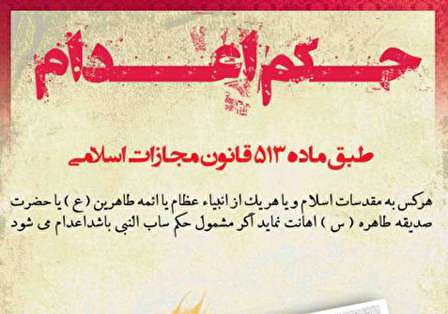Accusation of Sab-ul-Nabi; The latest status of three prisoners of conscience sentenced to death and imprisonment
Ariyai Community News Agency – Farhad Shireh Sa, Yousef Mehrad and Seyed Sadrullah Fazeli Zare, three prisoners of conscience are serving their sentences in Arak prison. Among these people, Yusuf Mehrad and Seyed Sadrullah Fazli Zare have been sentenced to death on the charge of “Sab al-Nabi”.
According to the news agency of Jamia Aryaei, quoting from Harana, Farhad Shireh Sa, Yousef Mehrad and Seyed Sadrullah Fazli Zare, prisoners of conscience, are in Arak prison.
These three prisoners in July and June 2019 along with their four co-accused named Mohammad Zohra Vandi, Akram Safai Tawana, Ali Mohammad Falah Rashkala, Kobri Imani, in relation to the management and membership of a telegram channel entitled “Criticism of Superstition and Religion” They were arrested by the security forces.
The case of these 7 people was divided into three parts according to the numerous charges and considering the jurisdiction of the court to deal with the charges, two parts of which were handled in the Arak Criminal Court and the other part in the Arak Revolutionary Court. One part of the case was regarding the handling of the accusations of Farhad Shireh Sa, Mohammad Zohra Vandi, Akram Safai Tawana, Ali Mohammad Falah Rashkala, Kobri Imani, which was held in Branch 105 of the 2 Arak Criminal Court. These people were tried for the charges of “insulting sacred things, falsifying computer data, publishing lies through computer and telecommunication systems, and using other registered documents in an unauthorized manner.”
By the decision of this court, Farhad Shireh Sa was sentenced to a total of 8 years of imprisonment and 25 million Tomans fine, as well as Mohammad Zohra Vandi, Akram Safaei Tawana, Ali Mohammad Falah Rashkala, and Kobri Imani were all sentenced to fines.
In the second part of the case, the accusations of Sadrullah Fazli Zare and Yusuf Mehrad were dealt with in the first branch of the Criminal Court of Arak, headed by Judge Mehrandish. These two citizens were tried and sentenced to death by this court on the charge of “Sab al-Nabi”. Due to the fact that some charges were under the jurisdiction of the Revolutionary Court, the third part of the case was heard in Branch 1 of the Arak Revolutionary Court.
In this part of the case, Farhad Shireh Sa Komleh, Youssef Mehrad and Seyed Sadrullah Fazeli Zare were tried for the charge of “forming and being members of groups and groups with the intention of disrupting the security of the country” and each was sentenced to 8 years in prison. By applying Article 134 of the Islamic Penal Code and submitting to the vote, the punishment of these citizens was reduced to 6 years in prison each.
It should be noted that Yusuf Mehrad and Seyed Sadrullah Fazli Zare were kept in solitary confinement for 2 months after their arrest.

The long history of the Islamic Republic in confronting the freedom of belief with accusations such as blasphemy and insulting holy things and…
Since the beginning of its formation, the Islamic Republic has accused the critics of accusations punishable by death, they have broken every pen that he writes against his wishes and beliefs, and they have responded to them with prison, execution, exile and displacement. According to Article 513 of the Islamic Penal Code, the death penalty is death.
The International Human and Moral Union, in its first report published in 2012, announced that seven people were executed for “blasphemy”, “apostasy”, or changing religion in Iran, some of which were beheaded in public.
Sina Dehghan, a 20-year-old Iranian, was sentenced to death on charges of seb al-nabi.
Sohail Arabi, an Iranian blogger, was sentenced to death on the charge of insulting Islamic sanctities by managing pages on Facebook.
In the Islamic Republic, blasphemy and insulting Islamic teachings is called “blasphemy”, and so far people have faced punishment and even execution for this accusation.
In May 2012, singer and poet Shahin Najafi faced a harsh reaction from the judicial system of the Islamic Republic of Iran for singing a song.
The authorities of Taqlid declared him an apostate and his song as an example of Sab-ul-Nabi.
On June 9, 2009, singer Mohsen Namjoo was sentenced in absentia to five years in prison for mocking the Quran in a song.
In March 2009, Iranian blogger Omidreza Mirsiafi died in Evin prison while serving a 30-month sentence for criticizing religion. The authorities declared the cause of his death to be suicide.



